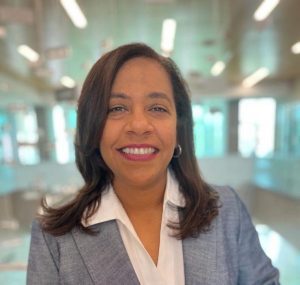 Fanny Hernandez joined UConn Extension as our Evaluation Specialist in April. She is from the Dominican Republic, and before moving to Connecticut, she lived in Kalamazoo, Michigan, for almost nine years. She earned a bachelor’s degree in industrial engineering from the Santo Domingo Institute of Technology (INTEC) and a certificate in education in the Dominican Republic. Hernandez furthered her studies with a master’s degree and a Ph.D. in Evaluation, Measurement, and Research at Western Michigan University in Kalamazoo, Michigan. Her educational background and work experience have equipped her with the necessary skills for her role at UConn Extension.
Fanny Hernandez joined UConn Extension as our Evaluation Specialist in April. She is from the Dominican Republic, and before moving to Connecticut, she lived in Kalamazoo, Michigan, for almost nine years. She earned a bachelor’s degree in industrial engineering from the Santo Domingo Institute of Technology (INTEC) and a certificate in education in the Dominican Republic. Hernandez furthered her studies with a master’s degree and a Ph.D. in Evaluation, Measurement, and Research at Western Michigan University in Kalamazoo, Michigan. Her educational background and work experience have equipped her with the necessary skills for her role at UConn Extension.
What is your area of interest?
My area of interest is program evaluation. I am a pragmatism researcher and evaluation specialist interested in finding practical solutions to solve or alleviate societal problems. I became interested in the evaluation field when I managed the quality assurance and control of the processes to gather empirical evidence for the K-12 education system and various programming efforts. Such efforts aim to inform education stakeholders and support them in making informed decisions. Since then, I have become enthusiastic about efforts to conduct evaluations and their usefulness in making informed decisions that improve programming and guide future programming. At one point in my early professional career, I reflected that my passion needed to be tied to action, and I decided to focus on facilitating and assisting evaluation practitioners in their evaluation efforts by developing supporting materials such as tools, manuals, and rubrics that enhance the effectiveness of their work.
What is your role with UConn Extension?
At the micro level, my role at UConn Extension is to enhance my professional capacity in program evaluation of the extension system’s human resources, in this case, Extension professionals. In this role, I assist Extension professionals in designing an evaluation plan, defining strategies to collect data about statewide indicators, or implementing evaluations. I also facilitate the evaluation efforts of UConn Extension professionals’ evaluation practitioners by developing the infrastructure for program evaluation (e.g., evaluation materials such as tools, templates, manuals, data collection instruments, and rubrics to measure specific variables) that enhance their effectiveness and efficiency when conducting tasks in program evaluation. In my role, I also design and deliver professional capacity opportunities in program evaluation to Extension professionals.
At the macro level, I am deeply committed to supporting the UConn Cooperative Extension system in achieving its mission. My role is crucial in providing credible evidence about programming, which in turn supports the system in presenting the public value of programming to improve CT residents’ lives and make CT a better place. I am committed to contributing to this mission through my work. I am excited about the impacts we can accomplish together.
What excites you the most about working with UConn Extension?
I am truly enthusiastic about my role at UConn Extension. I am excited about the opportunity to simplify the work of Extension professionals in program evaluation efforts and contribute to smoothing such tasks by developing an infrastructure for program evaluation and providing technical assistance to their efforts. I am also eager to offer in-service professional capacity opportunities in program evaluation to Extension professionals. As a pragmatist researcher and evaluation specialist, I find the most rewarding aspect of my work at UConn Extension is my contribution to supporting UConn’s land-grant mission to diffuse research knowledge and transfer that knowledge into practice in a more effective, efficient, relevant, and sustainable way through Extension programming. I am more motivated to support making CT a better living place through UConn Cooperative Extension work. I am even more excited to contribute to disseminating the UConn Extension work outcomes by letting people know about the efforts of our Extension staff, as well as what we are achieving with CT communities, resources, and environments.
What is one thing you hope people will learn from you and your work?
I envision communicating my passion for improving things and infusing my motivation to pursue such efforts with others. I have adopted the phrase, ‘There is always room for improving things.’ I believe that we can always find ways to improve what we do. As professionals, we must pause and reflect on the question, ‘ Are we doing the right thing? ‘ What is the evidence of our decisions? What is the validity and reliability of this evidence? So, can I trust that evidence? My goal at UConn Cooperative Extension is to support the reflection of these questions and support our team in generating credible evidence about the programming outcomes that communicate our evaluation stories. We are working together to improve our programmatic practices based on evidence so we can continue to make informed decisions that fit the needs of people in Connecticut. I am part of this team to support embracing the best evaluation practices at UConn Cooperative Extension. We are working together to ensure the improvement of our work outcomes now and in the long term. With our efforts, we envision making Connecticut a better place to live now and in the long term.
Anything else you think we should know?
I believe in hard work, professionalism, ethics, passion, and authenticity in what we do. I am committed to contributing through my work to making Connecticut a better place to live. This commitment is a driving force behind my work, and I hope it inspires others to contribute to our collective goal of improving our community.